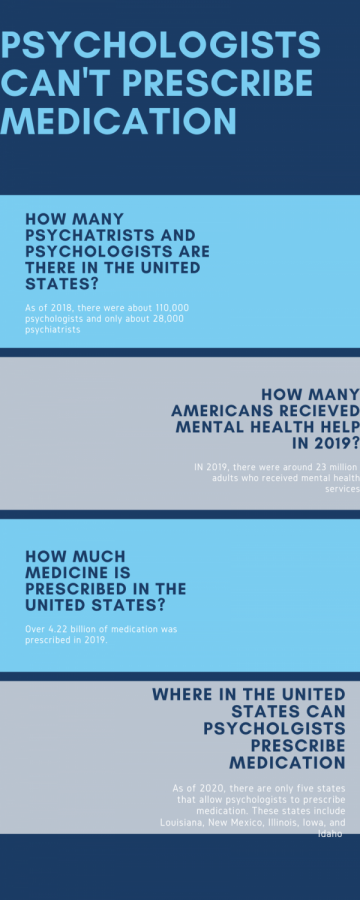Psychologists can’t prescribe medication
January 16, 2021
According to Statista, approximately $511 billion went into medicine in 2019. In an article by PRNewswire, around $225 billion dedicated to patients seeking help for mental health. There is some controversy about whether psychologists should be able to prescribe medication or not. According to Psychologytoday, only five states have allowed clinical psychologists to prescribe medication rather than just psychiatrists.
“I think psychologists should not be able to prescribe medication,” senior Caroline Clark said.
“I believe that psychiatrists go through way more extensive education and training than psychologists and I believe they have two separate roles in the psychology field. I think if someone is going to be able to prescribe a drug they need to understand all the effects of it and that requires medical school rather than what they are proposing which are learning seminars or classes for licensure.”
Psychiatrists can spend over 14 years in college which equates to upwards of 120,000 hours preparing for their job. Psychologists spend nearly 20,000 hours less, needing around 100,000 for their degree. While both dedicate time and hard work, psychiatrists need to go to medical school which gives them more responsibilities.
“While psychologists typically have book knowledge of a variety of medications and what they are intended to treat, we don’t have the medical training necessary,” school psychologist Kristina Crawford said. “Oftentimes, psychologists and psychiatrists will consult about specific patients, and psychiatrists may use information from those psychologists in making prescription decisions.”
According to Verywellmind, patients often have to wait a long time for appointments with psychiatrists because of there being a shortage of psychiatrists in many states. Allowing psychologists to prescribe medication would allow patients to get the mental health resources they need even faster.
In an article by BetterHelp, going to a psychiatrist costs around $300 each visit which could be expensive for some families. Similarly in an article by Northwestern Mutual, going to the psychologist usually costs $150 which is much more affordable. Psychologists being able to prescribe medicine would benefit lower-income families with getting the treatment and medication they need at a lower price.
“Although I don’t believe it would be super beneficial, one of the biggest pros would be patients would not have to see another specialist say if their therapist is only a psychologist and not a psychiatrist,” Clark said. “The therapist would know the patient better and be able to ultimately have a deeper knowledge, not about the medication but about the patient themselves, than if the patient had to be referred to a psychiatrist.”



